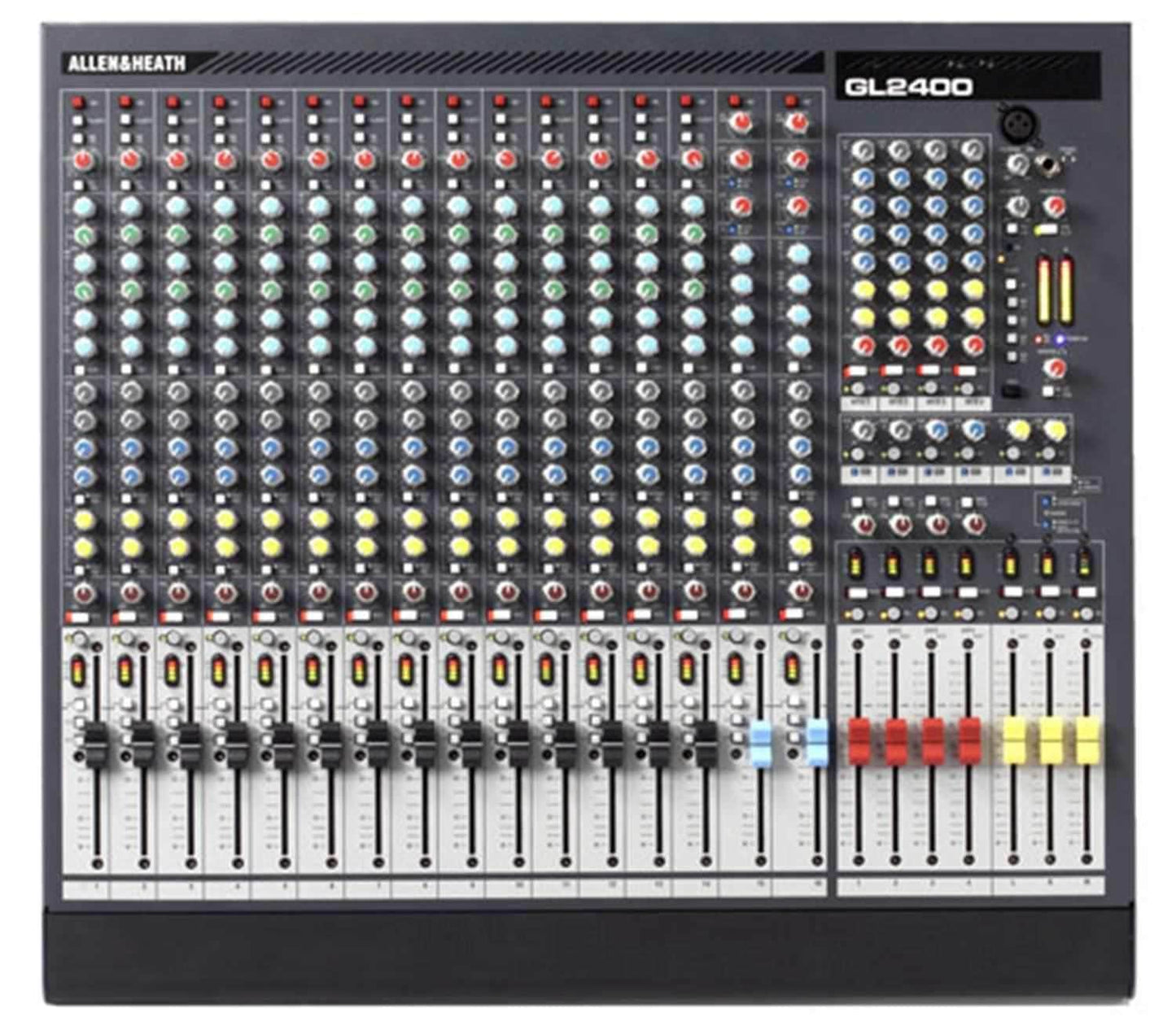For 35 years, Allen & Heath has designed truly innovative mixers for the real world and has earned its enviable reputation for superior performance, functionality and build quality. Building on the success of the industry-standard GL2200, Allen and Heath presents the new 4-buss dual-function GL2400 - the next generation of a mixing classic. This mixer is designed for professional applications. Whether mixing Front-of-House, monitors, or both, recording live or in the studio, installed in a busy or house of worship, out on the road touring or earning its keep in rental stock, the GL2400 provides the perfect solution.
Features:- LR and M main outputs
- 4 Audio groups with pan control
- 6 Auxiliary sends with per-channel pre/post fader switching
- 2 stereo channels each with mic and dual stereo line inputs
- 7x4 Matrix
- Proper dual functionality for FOH and/or Monitor mixing
- M can be configured as LR sum, Wedge, or Aux-Fed Sub or C master
- Recording capable with channel direct outputs
- Matrix external inputs with level trims and common input capability
- Stereo channel line inputs can be independently routed to LR
- Stereo channel mic input breakpoints for cross patching into matrix
- Responsive 4 band, 2 sweep EQ
- 100Hz channel high pass filters
- Individual phantom power and Polarity switching
- Dedicated Channel, Master and stereo Monitor meters
- Internal jumper plugs for pre/post-EQ aux, direct out and other options
- Mutes, meters and AFL on all fader masters
- Assignable talkback
- 1kHz oscillator and pink noise generator
- 2-track monitoring and replay to LR
- Headphones and local monitor outputs
- Electronically balanced XLR outputs with +26dBu drive capability
- Preamp +34dBu maximum input capability for mic or line
- Ultra low noise mix head amp design
- Internal power supply with MPS12 backup supply input (16 to 32 models)
- External RPS11 power supply and socket for backup supply (40 model)
- 100mm dust protected faders
- Metal jacks, gold-plated XLRs, sealed pots and switches
- Individual circuit card assembly with nutted pots
- Solid copper bus bar grounding
- Sys-Link V2 console linking option
- 4-pin XLR lamp sockets
As pioneers of dual functionality, Allen and Heath have ensured that every detail of the concept has been carefully implemented with no controls redundant in either mode. When mixing Front-of-House, the monitors can be set pre-insert as well as pre-EQ to prevent your house mix EQ and compression affecting the stage mix. Per channel aux switching means you can mix pre-fade with post-fade sends such as theatre radio mics and sound effects. As a monitor console, the aux masters get faders, inserts, mutes, meters and balanced XLR drive. You even get a fader controlled engineer' wedge feed. The Groups and LR mixes are still available to create yet more sends. In monitor mode the GL2400 can provide up to 10 mixes, for example 6 wedge and 2 stereo IEM.
Performance:The mic preamp has an extended 74dB gain range with massive headroom able to deal with the widest range of signals right up to +34dBu. From the new low-noise mix amp through responsive 4 band EQ to the differential balanced +26dBu outputs, every stage has been carefully designed to ensure optimum gain structure and the best sonic performance possible.
Third Fader:There are three master faders on the GL2400. The configurable M fader lets you create an LR sum mono fill, an engineers monitor wedge feed, or a dedicated centre or sub-bass speaker mix from Aux 6 which means you can dial in exactly what you need from each channel. L, R and M each provide a dedicated meter, mute, AFL and balanced XLR output.
7x4 Matrix:The matrix is a big feature for corporate AV work, specialised recording and broadcast feeds, and personal monitoring. Smart auto-switching of the external inputs lets you add a common mono, stereo or independent sources to the matrix. Cross patch from the stereo channel mic breakpoints to add room ambience to your recording and IEM feeds.
Dual Stereo Channels:These two multi-function channels provide a mic and 2 stereo line inputs each. Use the channels as mic inputs while the 4 stereos are independently routed to LR, or combine stereo sources such as backing tracks and reverbs while the mics are patched elsewhere, or use conventional stereo channels while the second inputs provide additional returns and the mics patch into the matrix for ambience.









